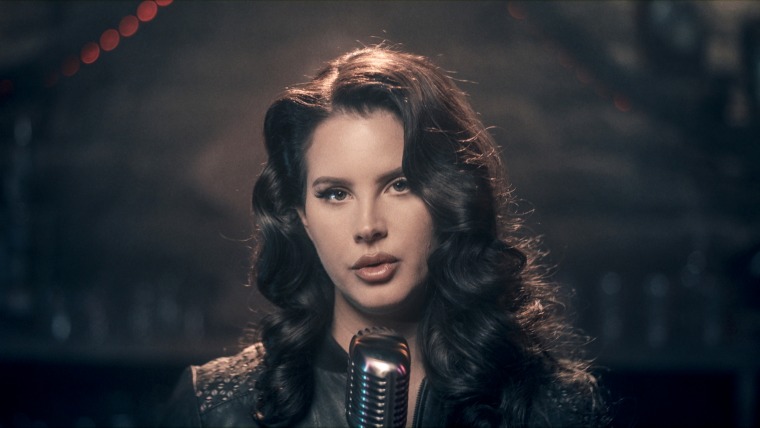Lana Del Rey's "Young and Beautiful" song is being used as part of a recent TikTok trend where people juxtapose how celebrities look now with how they looked earlier in their careers.
But some say they believe the trend — which features a clip of the song's lyric "Will you still love me when I’m no longer young and beautiful?" alongside images of celebrities — is problematic because it's ageist.
Critics of the trend, who have made videos or written comments calling it out, have noted that some of the celebrities featured, who are usually women, are still relatively young and have not aged much. Some simply appear to have gained weight.
In one video featuring Adriana Lima, a user juxtaposed images of the model when she was a Victoria's Secret model with a photo of her when she was pregnant. Even Del Rey, 37, was used as a subject in a video, which uses images of her taken by paparazzi.
“It’s such a backhanded compliment. I just don’t know how I would feel if someone said that about me,” said singer and TikToker Geralyn O’Connor, 20, who made a video calling out the trend. “As a woman, you’re obviously going to gain weight as you get older. We need to normalize weight gain."
The “Young and Beautiful” controversy comes on the heels of other ageist and fatphobic memes and trends. A recent viral tweet proclaimed that singer and actor Miley Cyrus is “loved by God” because of her youthful appearance at age 30. It’s unclear if the tweet was earnest or in jest, but many replied saying that age 30 isn’t old. Meanwhile, on TikTok, a common insult is calling someone “30” if they’re out of touch or appear to not be a teenager.
“I think there’s this trend in our generation to be scared of aging,” O’Connor said.
It is unclear when the "Young and Beautiful” trend started. TikTok did not immediately respond to a request for comment on Thursday. The platform referred Buzzfeed News to its community guidelines, which states that content that could cause adverse health outcomes, such as those that promote disordered eating, aren't allowed on the platform.
"We are committed to maintaining a supportive environment for our growing community," the guidelines read.
TikTok also offers a guide around disordered eating and encourages its users to talk to someone, take a break, and to learn individual triggers if a user is "frequently feeling stressed, anxious, upset, or confused about food, or your weight or shape."
I think there’s this trend in our generation to be scared of aging
-Geralyn O’Connor, singer and tiktok creator
Linda Charmaraman, director of the Youth, Media & Wellbeing Research Lab at the Wellesley Centers for Women, said it's not just Gen Z's fear of aging that has driven some of the stigmatizing social media trends, but also youthful ignorance.
Social media trendsetters are often thought to be high school age, but actually skew even younger nowadays. Many are roughly middle school age, she said.
"The middle schoolers are setting the trends and if they are 13 then 30 is actually quite a long way to go," Charmaraman said.
For teens in that age range, their brain development makes it difficult for them to imagine themselves as 30-year-olds one day. During that phase of development, teens, and especially teenage girls, are frequently comparing bodies.
"There's a lot of consciousness, and physical consciousness, of appearance and appearance-related cultures especially on TikTok and places like Instagram," Charmaraman said.
Still, seeing anti-aging content can be harsh for those who are nearing or have entered their 30s.
TikTok content creator Nathaly Juarez, 32, wanted to dispel some of the stigma around aging on TikTok. She posted a video in October about aging, in which she said, "30s are the best. Have pride in your age."
She said she feels like, in general, things are trending more positively for both age acceptance and body positivity, and that some of the more harmful memes and trends are likely from young people who don't know better.
"I think it is just a lack of experience from these kids making these edits," she said.
More from NBC News’ Culture & Trends team
Celebrities have also begun speaking out about the ageism they have experienced.
In an interview with Elle Magazine earlier this year, actor and director Olivia Wilde, 38, said she’s faced ageist hate on social media from other women.
“It’s so interesting for me when that comes from women because I’m like, ‘Do you plan on not getting older? Or if you already are older, do you feel that you don’t deserve the same opportunities in life?’” she said. “It’s so sad to me to look at that and realize people have such small expectations for their own lives and they are projecting those expectations onto me. And I reject your projections.”
Both Juarez and O'Connor said that they feel people in their 20s and 30s feel enormous pressure to be accomplished in their personal lives and careers. They both said at their respective ages, many of their peers feel like they're running behind, which leads to their internalized stigmatization of aging.
“We’re 20 and we feel like we’re so old," O'Connor said. "I think it’s a pressure, especially as a woman, to [not] age.”
Having the ability to age should be looked at as a gift, and that includes turning 30, O’Connor said.
“I find it so weird that as a society we’ve made 30 like this terrible thing," she said, "when I feel like being 30 is such a beautiful thing."

